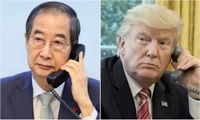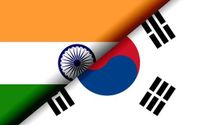In a significant diplomatic exchange, South Korean Prime Minister and acting President Han Duck-soo spoke by telephone with U.S. President Donald Trump on Tuesday evening, April 8, 2025. This conversation occurred just 16 hours before the U.S. was set to impose high reciprocal tariffs against 57 countries, including South Korea, at 12:01 a.m. Wednesday EST (1:01 p.m. KST on April 9, 2025).
This direct communication marks the first interaction between the South Korean and U.S. leaders since Trump returned to office in January 2025. The 28-minute call took place between 9:03 and 9:31 p.m. and addressed various pressing issues, including the strengthening of the bilateral alliance, trade balances, and cooperation on North Korea.
During the conversation, Han underscored his commitment to high-level cooperation with the U.S. in three key areas: shipbuilding, liquefied natural gas (LNG), and trade balance issues. The two leaders planned to continue constructive ministerial-level discussions aimed at finding “win-win” solutions regarding economic cooperation and trade balance.
However, the Prime Minister’s office did not elaborate on discussions surrounding the 25% reciprocal tariffs that the U.S. had imposed on South Korea. Shortly after the call, Trump took to his Truth Social account, expressing satisfaction with the conversation. He noted that they discussed South Korea's “tremendous and unsustainable [trade] surplus” with the U.S., tariffs, shipbuilding, and the large-scale purchase of U.S. LNG.
Trump also highlighted South Korea's military payments, stating, “They [South Korea] began these Military payments during my first term, Billions of Dollars, but Sleepy Joe Biden, for reasons unknown, terminated the deal.” He expressed optimism about the potential for a favorable deal, saying, “Their top TEAM is on a plane heading to the US, and things are looking good.”
Analysts interpreted Trump's remarks as an indication of his intention to renegotiate South Korea's share of the costs for U.S. Forces stationed there and to discuss investments in Alaskan LNG in the context of the tariffs. Earlier that day, Han had signaled his strong commitment to negotiating with the U.S. during an interview with CNN, labeling the tariff measures as “a pity” and expressing hope for an agreement before factory lines in South Korea closed.
When asked about the possibility of South Korea forming an alliance with China and Japan against U.S. tariffs, Han firmly stated, “We will not take that route.” He downplayed a recent meeting among the economic and trade ministers of Korea, China, and Japan, characterizing it as routine rather than extraordinary.
This call comes after a prolonged diplomatic vacuum following the impeachment of former President Yoon Suk-yeol and a subsequent power struggle in South Korea. Trump had a brief conversation with Yoon shortly after his election in November 2024, but this was the first significant dialogue at the highest level in five months due to political turmoil in South Korea.
Other nations affected by the U.S. tariffs, including Japan, Vietnam, and Taiwan, have engaged in intense lobbying efforts to negotiate concessions with the U.S. Vietnam has proposed lowering tariffs on American imports to 0%, while Japanese Prime Minister Shigeru Ishiba arranged an emergency call with Trump the night before Han's conversation.
As the global economy grapples with disruptions caused by the Trump administration's tariffs, South Korea is under pressure to diversify its trade partnerships. Recognizing the urgency, the Embassy of India in Seoul, along with the Korea Institute for International Economic Policy (KIEP), recently hosted the "Korea-India Economic Partnership Forum: Shaping the Future of the Indo-Pacific." This event aimed to enhance economic cooperation between India and South Korea.
During the forum, Indian Ambassador to South Korea Amit Kumar highlighted the growing Korean investments in India and the potential for collaboration in sectors such as shipbuilding, green hydrogen, and electric vehicle technologies. KIEP President Siwook Lee emphasized the importance of engagement in light of the Indo-Pacific’s growing significance.
Business leaders from major South Korean conglomerates, including Hyundai and LG, shared their success stories in India, while startups like Balance Hero showcased their growth in the Indian market. Bilateral trade between India and South Korea has reached approximately $25 billion, with major Korean companies establishing a strong presence in India.
Samsung operates one of its largest mobile phone manufacturing facilities globally in Noida, while Hyundai has made India a key export hub for its vehicles. Government initiatives such as the Comprehensive Economic Partnership Agreement (CEPA) and Korea Plus Desk have further bolstered Korean investment in India.
Despite these advancements, experts believe that the full potential of the India-South Korea economic relationship remains untapped. Professor Sandip Kumar Mishra of Jawaharlal Nehru University pointed out the need to “walk the talk,” emphasizing the importance of turning good intentions into actionable progress.
As South Korea seeks to diversify its export markets in response to the tariffs, the complementary needs of India and South Korea could foster a robust partnership. India’s demand for high-tech investment and infrastructure development aligns well with South Korea’s strengths in advanced manufacturing and technology.
To realize the full potential of their economic relationship, both nations must adopt proactive policy strategies. South Korea should focus on establishing a committed strategy toward India, while India needs to promote South Korea’s capabilities in high-tech manufacturing and defense exports.
In a time of global uncertainty and shifting alliances, India and South Korea have a unique opportunity to build a forward-looking economic partnership that addresses the strategic imperatives of the Indo-Pacific.





